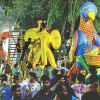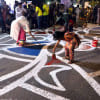Bangla New Year: Sweetmeat makers see huge sales
Exchange of sweets, known as misthi in Bangla, is very common in social and religious rituals in Bangladesh. But the Pahela Baishakh, the first day of Bangla New Year, has become the biggest occasion for sweet makers and sellers in recent years.
A buying spree of the corporate sector has pushed up this year's sweet sales by three times compared to that of the normal days. Corporate companies send sweets to their dealers, retailers, clients, banks, media outlets and friends as gift.
“We have bought 24,000 pieces of large rosgolla this year. Each piece costs Tk 25,” said a senior official of a business group that has exposure to steel and cement business.
The group alone spent around Tk 6 lakh for buying rosgolla. Other business groups, banks, non-banking financial institutions, public relations firms, television channels and different trade bodies and associations have spent significant sums of money just to buy sweets on Pahela Baishakh.
According to Bangladesh Sweets Manufacturers Association, around 3,500 sweetshops are registered with the organisation. Of them, around 250 are in the capital city.
The association has no data on the sales turnover of sweets in the country. But its leaders said their sales during the Bangla New Year go up by two to three times than during regular sales period.
“Our Pahela Baishakh sales are higher by 2.5 times compared to regular sales period,” said Mohammed Ali, president of Bangladesh Sweets Manufacturers Association and also the owner of Muslim Sweets.
He said sweet makers who have corporate clients are making the most out of this occasion.
For example, Premium Sweets, a high-end sweet maker, has seen a significant rise in its sales this year.
Mahbubur Rahman Bakul, head of corporate affairs of Premium Sweets, said their sales almost doubled on this occasion compared to last year's sales.
He said 70 percent of the private banks are their clients and they bought a good amount of sweets on this occasion because of Premium's high quality.
“Corporate companies send sweets and allied products as gift to different offices, clients and special persons,” he added.
He, however, refused to disclose their sales figure on Pahela Baishakh as it is a “business secret”.
Mehedi Hassan, manger of Bonolata Sweets and Bekary's Uttara outlet, said demand of sweets increases during Pahela Baishakh celebrations.
“We sold sweets worth at least Tk 150,000 yesterday compared to an average of Tk 50,000 on a normal day,” said Mehedi of Bonolata Sweets which has 10 outlets in the capital.
Nurul Alam, director of Modhuban, a Chittagong-based sweet producer, was sharing his experience about this year's Baishakh sales in the capital's Green Road outlet.
“Our sales at 13 shops in Dhaka are go up by nearly three times during Baishakh than that of a regular sales period,” said Alam.
Didarul Alam Chowdhury, owner of Banoful & Co, said sales of sweets go up during Pahela Baishakh as it is the biggest cultural event in the country.
He, however, said demand for sweets reaches its peak when the results of SCC and HSC exams are published.

 For all latest news, follow The Daily Star's Google News channel.
For all latest news, follow The Daily Star's Google News channel. 






Comments